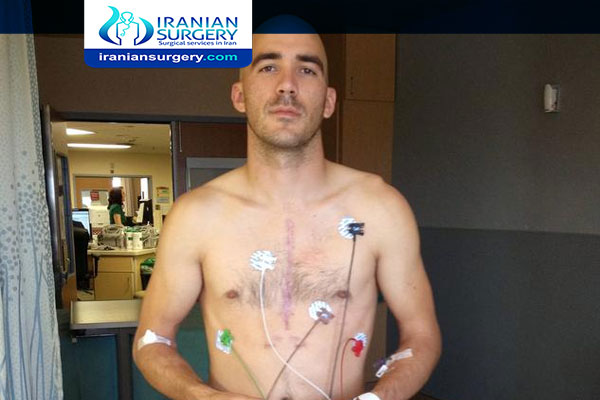Heart Valve Replacement Recovery
Life After Valve Replacement
What is the average hospital stay for a heart valve replacement?
Exercise after heart valve replacement surgery
Diet after heart valve replacement
Do you feel better after heart valve replacement؟
Recovery Time
The normal recovery time after a heart valve surgery is usually four to eight weeks, and may be shorter after minimally invasive surgeries.
You can expect to stay in the hospital for about a week, including at least 1 to 3 days in the Intensive Care Unit (ICU).
Recovery after valve surgery may take a long time, depending on how healthy you were before the operation. You will have to rest and limit your activities. Your doctor may want you to begin an exercise program or to join a cardiac rehabilitation program.
If you have an office job, you can usually go back to work in 4 to 6 weeks. Those who have more physically demanding jobs may need to wait longer.
Read more about : Iranian eye surgeons restored vision to the eyes of an Omani child.
Read more about : Coronary artery bypass surgery (CABG) success story
Read more about : Balloon Valvuloplasty Surgery
Read more about : Heart Bypass Surgery
Read more about : Open heart surgery
Life After Valve Replacement
Most valve repair and replacement operations are successful. In some rare cases, a valve repair may fail and another operation may be needed.
Patients with a biological valve may need to have the valve replaced in 10 to 15 years. Mechanical valves may also fail, so patients should alert their doctor if they are having any symptoms of valve failure.
Patients with a mechanical valve will need to take a blood-thinning medicine for the rest of their lives. Because these medicines increase the risk of bleeding within the body, you should always wear a medical alert bracelet and tell your doctor or dentist that you are taking a blood-thinning medicine.
Even if you are not taking a blood-thinning medicine, you must always tell your doctor and dentist that you have had valve surgery. If you are having a surgical or dental procedure, you should take an antibiotic before the procedure. Bacteria can enter the bloodstream during these procedures. If bacteria get into a repaired or artificial valve, it can lead to a serious condition called bacterial endocarditis. Antibiotics can prevent bacterial endocarditis.
Read more about : Heart attack causes
Read more about : Angiogram procedure
Read more about : Echocardiogram
What is the average hospital stay for a heart valve replacement?
You can expect to stay in the hospital for about a week, including at least 1 to 3 days in the Intensive Care Unit (ICU). Recovery after valve surgery may take a long time, depending on how healthy you were before the operation.
Exercise after heart valve replacement surgery
Exercising will help to speed up your recovery, and it's a key component of a healthy lifestyle. Exercise increases your fitness levels, helps control blood pressure, weight and cholesterol, and keep you relaxed.
Read more about: Heart valve replacement surgery risks
Read more about: How long is heart valve replacement surgery?
Read more about: How serious is heart valve replacement surgery?
Read more about: heart valve replacement surgery
Diet after heart valve replacement
To keep blood vessels clear after bypass surgery, avoid foods high in fat and cholesterol, such as whole milk, cheese, cream, ice cream, butter, high-fat meats, egg yolks, baked desserts, and any foods that are fried.
Many studies have shown that a diet rich in fruits, vegetables, wholegrains, nuts and seeds can reduce your risk of heart disease. A healthy diet provides your body with plenty of heart-protective nutrients - like vitamins, minerals, antioxidants and dietary fibre.
Ideally, your diet should include:
- Meat- and/or meat alternatives such as eggs, tofu, legumes and nuts
- Fish- 2 serves of oily fish per week such as salmon, mackerel or sardines will help you get plenty of heart healthy omega-3 fats
- Wholegrains- good wholegrain choices include whole meal or wholegrain bread or crackers, brown rice, whole meal pasta, quinoa, barley, rye, rolled oats, polenta and couscous
- Dairy- preferably low fat
- Healthy fats- a small amount of healthy fats and oils from nuts, seeds, avocado and oily fish
- Water - avoid sugary soft drinks and drink alcohol only in moderation
Aim to consume 2 serves of fruit, 5 serves of vegetables and 4 or more serves of wholegrains - depending on your energy needs. Some other tips to help you eat well include:
- Reduce your salt intake- use as little salt as possible when cooking as this will help to lower your blood pressure and help prevent fluid retention.
- Avoid sugary foods- these are often eaten in place of healthy foods and can contribute to weight gain.
Do you feel better after heart valve replacement
The life expectancy after valve replacement varies with age, but life-table analyses of large datasets suggest the average life-expectancy of a 60 year old after aortic valve replacement is about 12 years. Your breastbone will usually heal in about 6 to 8 weeks, but it may be 2 to 3 months before you feel your normal self again.
Read more about : How to pop a bartholin cyst yourself?
Read more about : Virgin tightening surgery before and after
Read more about : Rectal bleeding
Read more about : Sleeping position for fissure?
Read more about : Ovarian cyst size chart
Read more about: What is the success rate of heart valve replacement surgery


